
Transcriber's Note:
The cover image was created by the transcriber and is placed in the public domain.

| NEW YORK | CINCINNATI | CHICAGO |
The use of dramatic readers has passed beyond the experimental stage. Their value in arousing interest, in stirring the imagination, in quickening literary appreciation and power of interpretation, has been so clearly demonstrated as to make them permanent textbooks in the elementary schools, and more particularly in the primary grades. The present difficulty consists, therefore, not in uncertainty of the value of dramatic literature, but in the inadequacy of the supply. The need of suitable literary material in good dramatic form for the primary grades is still very great. This little book has been compiled as one step toward meeting this need at least in one particular school, but it is hoped that it may prove of service in many other schools. It is intended for use at the end of the first, and at the beginning of the second, year.
For permission to use copyright material in this volume, acknowledgments and thanks are proffered to authors and publishers, as follows:
To Laura E. Richards, for the adaptation from her story, “The New Year”; to Dodd, Mead & Co. for “Mabel and the Green Lizard,” adapted from “The Adventures of Mabel,” by H. T. Peck; to G. P. Putnam’s Sons, of New York and London, for the selection by Judge Parry from “The Golden Staircase”; to Longmans, Green, & Co. for “The Odd Man and the Dog True”; and to John Lane Company for “Return of Spring,” by Dion Clayton Calthrop.
| PAGE | ||
|---|---|---|
| Bunny Rabbit | 7 | |
| The Odd Man and the Dog True | 14 | |
| The Owl and Grasshopper Green | 19 | |
| Somewhere Town | Kate Greenaway | 21 |
| The Timid Hare | 22 | |
| Mabel and the Green Lizard | Adapted | 26 |
| The Maiden and the Bird | Lydia Maria Child | 32 |
| The Little Fish | African Fable | 35 |
| Belling the Cat | 37 | |
| The Fox and the Crow | 40 | |
| Hans and Gretchen | 41 | |
| Lady Moon | Lord Houghton | 50 |
| Precocious Piggy | Thomas Hood | 52 |
| Strange Lands | Laurence Alma-Tadema | 56 |
| How to get a Breakfast | 58 | |
| The Little Christmas Tree | Adapted from an Old Story | 60 |
| Christmas Eve in an Attic | 65 | |
| The New Year | Adapted from Laura E. Richards | 73 |
| A Friendship Declined | 77 | |
| The Selfish Man | 79 | |
| The Magpie’s Nest | 83 | |
| Adventures of the First Spring | 86 | |
| The Bird’s Nest | Lydia Maria Child | 93 |
| The Boastful Bamboo Tree | Japanese Fable | 100 |
| 6Return of Spring | 105 | |
| Who holds up the Sky? | Adapted | 110 |
| The Fox’s Plan | 114 | |
| Tom and the Lobster | Adapted | 117 |
| Why the Jellyfish has No Shell | Oriental Fable | 119 |
| I would like You for a Comrade | Judge Parry | 132 |
| Southwest Wind’s Visit to Gluck | Adapted from John Ruskin | 134 |
| The Child and the Sparrow | Thomas Westwood | 143 |
| The Rabbit’s Message | German Tale | 145 |
| Laughing Sanja | Japanese Folk Story | 150 |
| The Tiger and the Brahman | 159 | |
| The Lion and the Story-teller | 169 | |
| Over the Hill | George MacDonald | 174 |
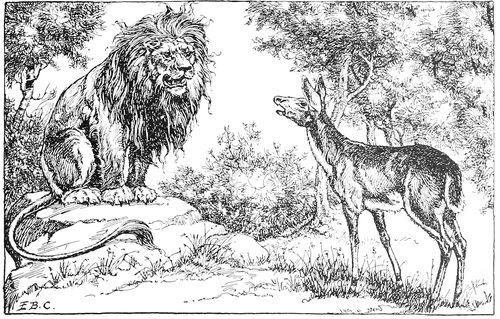
Mother Deer. Brave Lion, give me back my little deer.
Lion. I will not. The deer is mine.
Mother Deer. O Lion, it is the only one I have. I beg of you, give it back to me.
8Lion. A lion does not give back what he has taken. Be off, or I will eat you.
Mother Deer. Can you not help me, animals? The lion has taken my little deer, the only one I had.
Elephant. I am sorry for you. But the lion is the king of the forest. He takes what he will and keeps what he likes. I cannot help you.
Mother Deer. [Goes on.] Can you not help me, Camel? You are always kind and gentle.
Camel. The lion did wrong to take your deer. He did a great wrong, but I cannot help you.
9Mother Deer. [Goes on.] Surely, little jackal, you will help me.
Jackal. Sh! Sh! I’m afraid of the lion, myself. We’ve never been very good friends. I wish I could help you. Let me see. I have it! Go to Bunny Rabbit. He’s a little creature, but he’s wise and brave.
Mother Deer. You say he’s wise?
Jackal. He is.
Mother Deer. And brave?
Jackal. He is.
Mother Deer. Then I will go at once.
Bunny Rabbit. Good morning, Mother Deer. What is the matter?
10Mother Deer. Bunny Rabbit, that wicked lion stole my little deer and will not give it to me. I asked the forest animals to help me, but none was brave enough to do so.
Bunny Rabbit. Not even the elephant, or the camel, or the jackal?
Mother Deer. Not one. I asked them all. They all said they were sorry. But I believe they are all afraid of the lion.
Bunny Rabbit. Why did you come to me? I’m such a little creature.
Mother Deer. The jackal told me you are wise and brave, and he said that you would help me.
Bunny Rabbit. Tell them all to meet 11in front of my burrow. We will talk it over and see what can be done. [Mother Deer goes away, and Bunny Rabbit digs a long passage under the ground and then comes out behind a bush.]
Bunny Rabbit. Elephant, do you think the lion should keep the little deer?
Elephant. The lion is king of the forest, and he should keep the little deer.
Bunny Rabbit. Camel, what do you say?
Camel. Dear me. What can I say? It is all wrong. But I’m sure he
should keep what he stole.
Bunny Rabbit. How you tremble, little jackal! What do you say?

Jackal. [Seeing the lion.] Oh! Do I tremble? No, yes, no, yes, yes. I think he should keep the deer.
Bunny Rabbit. [In a loud voice.] The lion should not keep the deer! The lion is a wicked thief! [Lion springs at him. Bunny Rabbit darts down into the burrow.]
13Lion. [Looking into the burrow.] Gone down there, has he? Well, I’ll fix him. I’ll stay right here until he comes out. I’ll stay, and stay, and stay, until I starve him out.
Bunny Rabbit. Run, Mother Deer, and get your little one.
Mother Deer. Won’t that wicked lion come again?
Bunny Rabbit. No, no! He’s going to stay in front of my burrow until I come out. Ha! ha! He’ll starve to death himself if he waits for that! Ha! ha! [Mother Deer runs to the little deer, and both escape into the forest.]
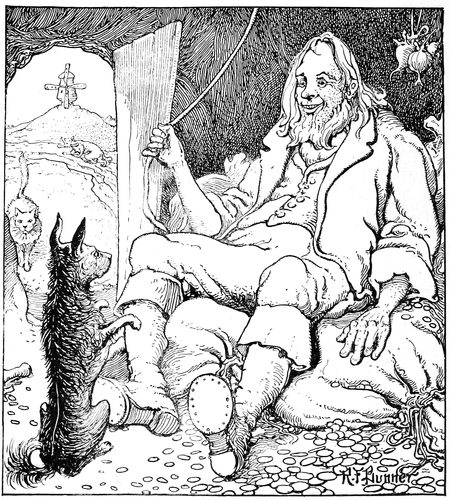
Odd Man. [To the dog.] Who are you, and why do you come into my cave?
15True. I am a poor dog, sir, who has lost his way. Will you be so kind as to tell me how I may get out?
Odd Man. No, I will not. But I will tell you what you may do if you like. You may stay here in my cave and work for me.
True. I will do that if you will not let me out. But what work do you wish me to do?
Odd Man. Well, well, you see I have here a great bag full of gold. I have to sit on it all the time.
True. Why must you sit on it?
Odd Man. I will tell you. Near my cave lives an ogre. This ogre wants to kill me so that he can get my gold.
16True. Dear me!
Odd Man. If I go to sleep or move away he will try to get at me. I am just worn out for want of rest.
True. Dear me! How can I help you?
Odd Man. Well, if you would stay by me and watch for the ogre, I might take a short nap.
True. I will do that! And you, sir, go to sleep. [Odd Man goes to sleep. Big Black Dog enters.]
Big Black Dog. Good day, little dog. How do you do?
True. I am very well, I thank you; but who are you?
Big Black Dog. My name is Nip, and I 17have come to show you the way out of this cave. Let us run now!
True. No; I said I would take care of this cave for the Odd Man, and I will do it.
Big Black Dog. But the Odd Man is asleep. He will not see you. Come, now, come along with me!
True. No, I will not go.
Big Black Dog. Then give me a bone, will you?
True. I cannot, for they are not mine; the Odd Man may give you one, by and by. [Big Black Dog goes to get a bone.]
True. Bow-wow-wow!
Odd Man. [Opening his eyes.] What was that? You woke me out of my nap.
18True. Oh, sir, it was a big black dog. It came into the cave and was stealing a bone.
Odd Man. Oh! That was the ogre in the dress of a black dog. Here, you may have a bone. You were a good dog to bark and wake me up. What more can I do to show you how glad I am?
True. Oh, sir, may I go out of the cave now? I want to see a nice, nice cat that is waiting outside.
Odd Man. Very well, good dog. The ogre will not come back again, and I can take a good nap. Here is a door in the side of the cave. I will open it, and you can go.—Good-by.
Grasshopper Green. Creak, creak, creak, c-r-e-a-k!
Owl. Won’t you keep quiet? I can’t sleep with your “creak, creak.”
Grasshopper Green. No, I will not keep quiet. Creak, creak, creak!
Owl. Then go away from here. Go into the grass field over there, if you must sing.
Grasshopper Green. I shall do nothing of the sort. I have as much right to sing as you have to sleep. Creak, creak! Besides, you have never 20done anything for me. Creak, creak, creak, c-r-e-a-k!
Owl. [To himself.] Such a saucy grasshopper green!
Grasshopper Green. Creak, c-r-e-a-k!
Owl. [Later.] Well, Grasshopper Green, you have a wonderful voice!
Grasshopper Green. I have indeed. Creak, creak, creak, c-r-e-a-k!
Owl. Now that I am awake, I love to hear you sing.
Grasshopper Green. C-r-e-a-k!
Owl. Let me give you some of the sweet honey I have here in my tree. Honey is good for the voice.
Owl. Snap!
First Child. Which is the way to Somewhere Town?
Second Child.
Oh, up in the morning early.
Over the tiles and the chimney pots,
That is the
way quite clearly.
First Child. And which is the door to Somewhere Town?
Second Child.
Oh, up in the morning early.
The round red sun is the door to go through;
That
is the way quite clearly.
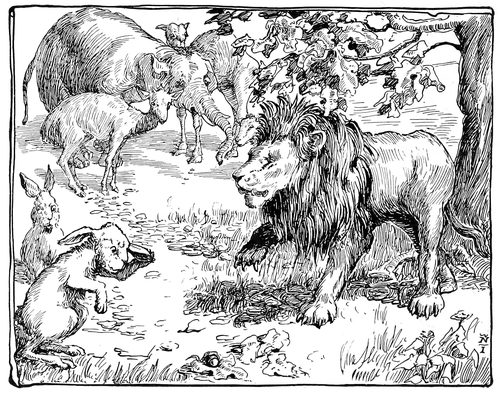
Timid Hare. Oh dear! Oh dear! If the sky were to fall, what would happen to me? Oh, what would happen to me! What is that noise? 23Oh dear! Oh dear! Oh, I am sure the sky is falling! It is! It is! It is! [Timid Hare runs.]
Brother Hare. Why are you running away, little hare?
Timid Hare. Oh, I have no time to talk. The sky is falling!
Brother Hare. [Frightened.] Oh dear! Oh dear! The sky is falling!
Deer. Why, what is the matter, little hare?
Timid Hare. Oh, I have no time to talk. The sky is falling.
Deer. [Frightened.] What shall I do?
Sheep. Where are you going, little hare? Why do you run so fast?
Timid Hare. Oh, the sky is falling!
24Sheep. [Frightened.] Dear me, dear me!
Camel. Stop a minute, little hare! What’s the matter?
Timid Hare. Oh, I have no time to talk. The sky is falling.
Camel. [Frightened.] No, no, it can’t be.
Elephant. Why do you run so fast, little hare? What has happened?
Timid Hare. I have no time to talk. The sky is falling.
Elephant. Can that be true?
Lion. What is this you say?
Timid Hare. I have no time to talk. The sky is falling.
Lion. How do you know this?
Timid Hare. I saw it.
Lion. Where did you see it?
25Timid Hare. There, by that tree.
Lion. Oh, what nonsense! There are no signs that the sky is falling. Come with me and I’ll show you.
Timid Hare. No, no, I must hurry along. I am afraid to go back.
Lion. Yes, you shall come with me to that tree. I will take you there myself. [Lion and hare go to the tree.]
Lion. There, do you see? The sky is not falling. A little acorn fell upon a leaf. It made the noise that frightened you. Let us go back now, and tell the other animals.
Mabel. Grandma, may I go to the woods to pick some berries for supper?
Grandma. Yes, but be sure to come home before dark. There are animals in the woods, Mabel. They prowl around after dark.
Mabel. Oh, I’m not afraid. I’ll come home before night.
Mabel. Dear me! How dark it is getting. I must hurry home. [Hears 27a little squeaking sound.] What’s that? [Sees a little green lizard with a stone on its tail.] Oh, you poor little lizard! Let me lift that stone from your tail. [Takes stone off.]
Lizard. Thank you. You are a very kind child.
Mabel. Oh! I didn’t know that lizards could talk!
Lizard. Some lizards can’t. But I am the king of all the lizards. I am going to do something for you because you lifted the stone from my tail.
Mabel. I was very glad to do it.
Lizard. I am going to do something for you that I wouldn’t do for any other little girl. It’s this: I’m 28going to teach you the animal call. Then you will understand everything the animals say to you, and they will know what you say to them.
Mabel. What fun!
Lizard. Just listen. [Gives a low whistle.] Now you do it after me. [Mabel tries.] Try again, Mabel. [She tries again and again.] Good, that’s it! Now if you wish any animal to be your friend, just whistle that way to him. That’s the call of all the animals. Good-by. [Lizard goes away.]
Mabel. Well, that’s the funniest thing I ever heard of. But, dear me, how dark it is getting. I must run home. [Starts homeward. Hears howl.]
29Wolf. [Howls.] O-ooo-w.
Mabel. What’s that? Oh! it’s a wolf. I’m so frightened! What shall I do? I’ll give the call.
Wolf. [Answers.] O-ooo-w! O-ooo-w!
Mabel. Wolf, I want you to be my friend.
Wolf. To be sure, I will be.
Mabel. I’ve lost my way. Please show me the way home. I live at grandma’s.
Wolf. I know where you live. I’ve seen you playing there many times. Put your hand on my neck, and I’ll show you the way. [Mabel does so.]
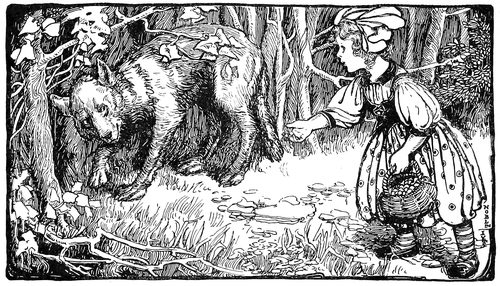
Wolf. There is your home; and your grandma is waiting for you.
Mabel. Thank you very much. I knew you were a good wolf. You wouldn’t hurt a little girl, would you?
Wolf. I wouldn’t hurt you.
Mabel. Good night, Wolf.
Wolf. Good night.
Grandma. Mabel! Mabel! Mabel!
Mabel. Yes, Grandma.
Grandma. Where have you been so long?
Mabel. I’ve been in the woods. Oh, Grandma. I left my basket of strawberries there.
Grandma. Never mind. We can go to-morrow and get them. I was so frightened! Your uncle told me only yesterday he saw a wolf in the woods. Just think if you had met him to-day! He would have eaten you up, every bit of you.
Mabel. Oh, Grandma! I’m sure all wolves don’t eat little girls.

Maiden.
Little bird, little bird, come to me,
I have a green cage ready for thee,
Beauty-bright flowers I’ll bring anew
And fresh ripe cherries all wet with dew.
Bird.
Thanks, little maiden, for all thy care,
But I love dearly the clear cool air
And my snug little nest in the old oak tree.
Maiden. Little bird, little bird, stay with me!
Bird.
Nay, little damsel,—away I’ll fly
To greener fields and warmer sky;
When spring
returns with pattering rain,
You’ll hear my merry song again.
Maiden.
Little bird, little bird, who’ll guide thee,
Over the hills and over the sea?
Foolish one, come in the house to stay,
For I’m very sure you’ll lose your way.
Bird.
Ah, no, little maiden, God guides me,
Over the hills and over the sea.
I will
be free as the rushing air,
And sing of sunshine everywhere.

Fisherman. Aha! I have you at last, little fish.
Little Fish. O Mr. Fisherman, please put me back into the water.
36Fisherman. Put you back? No, I will not!
Little Fish. I beg you, put me back. I am so little.
Fisherman. It has taken me a long time to catch you. Put you back, indeed! I think not.
Little Fish. But I am so little. Put me back and wait until I have grown to be a large fish. Then I will make you a very good meal.
Fisherman. [Thoughtfully.] True, my little fish, true. But where shall I find you when you have grown larger?
Old Mouse. Oh dear, dear, dear! That old cat ate Squeak Nibble to-day. What can we do?
Second Mouse. Well, we must do something! She’ll eat us all, one by one!
Third Mouse. How can we keep her from catching all the rest of us?
Fourth Mouse. Yes, how can we? If we could only know when she is coming. Her paws are so soft that we cannot hear her.
Second Mouse. I have it! One of us will watch her all the time. When 38the cat is coming he must squeak as loud as he can.
Old Mouse. Watch her, indeed! She’d soon catch that little mouse.
Fourth Mouse. No, that will never do.
Third Mouse. Let’s stay in our holes. Then she’ll starve to death.
All the Mice. Ha-ha-ha! A fine plan.
Old Mouse. A fine plan, indeed! Do you think the cat eats nothing but mice? And how should we get anything to eat if we stayed in our holes?
Fourth Mouse. My friends, listen to me. Let us hang a bell round her neck. That will tell us when she is coming. Then we can run and hide.
39Second Mouse. Good, good!
Third Mouse. The very thing!
Fourth Mouse. Nothing could be better.
Old Mouse. [Thoughtfully.] But who will hang the bell on the cat’s neck?
Second Mouse. I will not.
Third Mouse. Not this little mouse.
Old Mouse. But some one must do it. Who will?
All. Sure enough, who?
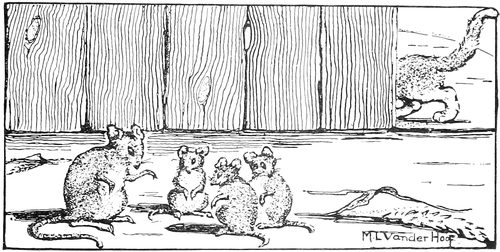
Crow. Ah! Some one has left a bit of cheese for me. I’ll fly up into that tree and eat it.
Fox. [To himself.] That cheese is for me, as sure as I am a fox.
Good day, Mistress Crow.
How well you are looking.
What bright eyes you
have.
I am sure your voice must be sweet.
Just let me hear you sing one song.
Crow. Caw—caw—caw.
Fox. [Snaps up cheese.] That bit of cheese was all I wanted.

Red Fox. Help me out! Help me out, little Hans. I am caught in this trap. Help me out, and it shall be well with you.
Hans. To be sure. I’ll let you out. There!
42Red Fox. You are very kind. If you have a wish, tell me what it is and it shall be granted.
Hans. Oh, as to that, I wish my pail here were full of berries. My sister and I are very hungry.
Red Fox. Your wish is granted. Look into your pail! [Hans runs home.]
Hans. See, Gretchen dear, what fine berries I have brought.
Gretchen. Oh, what big ones! Where did you get them in so short a time?
Hans. It was the fox, Gretchen. He was caught in a trap. I let him out. He said I might have 43whatever I wished for, and I wished for berries. Aren’t you glad?
Gretchen. Foolish boy! Why didn’t you ask for something better? If he could fill your pail with berries just for the asking, he could do far greater things.
Hans. But don’t you like the berries, Gretchen?
Gretchen. When we eat them there will be nothing left. Go back and tell the fox that you wish to have the cupboard always full of food.
Hans. Be satisfied, dear sister. We are quite happy as we are.
Gretchen. No, I will not be satisfied. You must do as I tell you.
Red Fox. How now, little Hans? Is it not well with you?
Hans. Alas! My sister is not satisfied. She asked me to come to you again.
Red Fox. What does she wish?
Hans. She wishes that our cupboard may be always full.
Red Fox. Go home, little Hans. It shall be as she wishes.
Hans. Why are you unhappy again, Gretchen? Come, let us play.
Gretchen. Why should I be happy? We have no toys, only sticks and 45stones for playthings. Go to the fox and tell him I wish for some beautiful toys to play with.
Hans. Be satisfied, little Gretchen. We are quite happy as we are.
Gretchen. No, I will not be satisfied.
Red Fox. How now, little Hans? Is it not well with you?
Hans. Alas! My sister is not satisfied. She asked me to come to you again.
Red Fox. What does she wish?
Hans. She wishes she had some beautiful toys to play with.
Red Fox. Go home, little Hans. It shall be as she wishes.
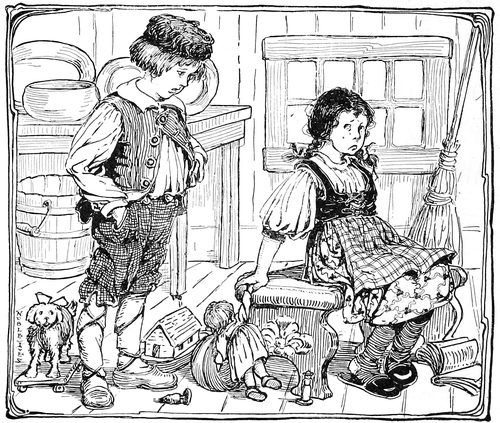
Hans. Why are you not happy, little Gretchen? Come, let us play.
Gretchen. Why should I be happy? I am tired of these old toys. I want a beautiful palace to live in. 47Go to the fox and tell him so.
Hans. Be satisfied, little sister. We are quite happy as we are.
Gretchen. No, I will not be satisfied. You must do as I tell you.
Red Fox. How now, little Hans? Is it not well with you?
Hans. Alas! My sister is not satisfied. She asked me to come to you again.
Red Fox. What does she wish now?
Hans. She wishes to live in a beautiful palace.
Red Fox. Go home, little Hans. It shall be as she wishes.
Hans. Why are you unhappy again, little sister?
Gretchen. Why should I be happy? I am tired of this palace. There is only one thing that would make me happy. Go to the Red Fox. Tell him I must have the great silver ball that hangs over us in the sky.
Hans. Be satisfied, dear sister. We are quite happy as we are.
Gretchen. No, no. I will not be satisfied. You must do as I tell you.
Red Fox. How now, brother Hans? Is it not well with you?
49Hans. Alas! My sister is not satisfied with the palace.
Red Fox. What does she wish?
Hans. She wishes the great silvery moon for her plaything.
Fox. [Very slowly.]
The great silvery moon!
The great silvery moon!
The great silvery moon!
Go, little Hans. It shall not be as she wishes. You will find the cupboard empty, the toys gone, and your home again a little cottage.

Child.
Lady Moon, Lady Moon,
Where are you roving?
Lady Moon. Over the sea.
Child.
Lady Moon, Lady Moon,
Whom are you loving?
Lady Moon. All that love me.
Child.
Are you not tired with rolling and never
Resting to sleep?
51 Why look
so pale and so sad, as
Forever wishing to sleep?
Lady Moon.
Ask me not this, little child, if you love me.
You are too bold.
I must obey my
dear Father above me
And do as I’m told.
Child.
Lady Moon, Lady Moon,
Where are you roving?
Lady Moon. Over the sea.
Child.
Lady Moon, Lady Moon,
Whom are you loving?
Lady Moon. All that love me.
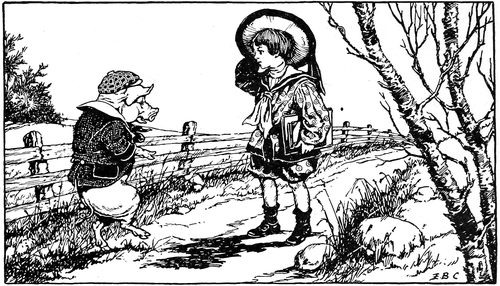
Child. Where are you going to, you little pig?
First Pig.
I’m leaving mother,
I’ve grown so big.
Child.
So big, young pig!
So young, so big!
What! leaving your mother, you foolish
young pig?
Child. Where are you going to, you little pig?
Second Pig. I’ve got a new spade, and I’m going to dig.
Child.
To dig, little pig!
A little pig dig!
Well, I never saw a pig with a spade that
could dig.
Child. Where are you going to, you little pig?
Third Pig. Why, I am going to have a nice ride in a gig.
54Child.
In a gig, little pig!
What, a pig in a gig!
Well, I never saw a pig ride in a
gig.
Child. Where are you going to, you little pig?
Fourth Pig. I’m going to the barber’s, to buy me a wig.
Child.
A wig, little pig!
A pig in a wig!
Why, who ever before saw a pig in a wig?
Child. Where are you going to, you little pig?
55Fifth Pig. Why, I’m going to the ball, to dance a fine jig!
Child.
A jig, little pig!
A pig dance a jig!
Well, I never before saw a pig dance a
jig!
Child. Where are you going to, you little pig?
Sixth Pig. I’m going to the fair, to run a fine rig.
Child.
A rig, little pig!
A pig run a rig!
Well, I never before saw a pig run a rig.
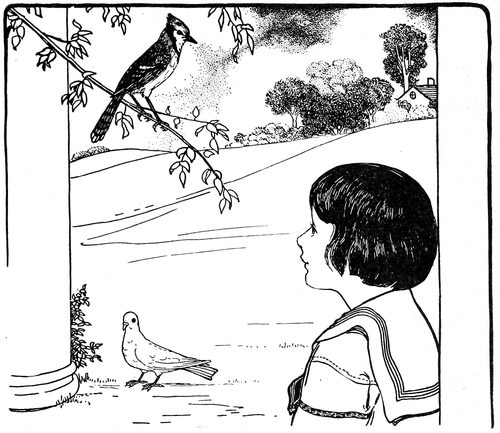
Child. Where do you come from, Mr. Jay?
Mr. Jay. From the land of play, from the land of play.
Child. And where can that be, Mr. Jay?
57Mr. Jay. Far away—far away.
Child. Where do you come from, Mrs. Dove?
Mrs. Dove. From the land of love, from the land of love.
Child. And how do you get there, Mrs. Dove?
Mrs. Dove. Look above—look above.
Child. Where do you come from, Baby Miss?
Baby Miss. From the land of bliss, from the land of bliss.
Child. And what is the way there, Baby Miss?
Baby Miss. Mother’s kiss—mother’s kiss.
First Chick.
It is so hard to scratch;
I’m as hungry as can be,
I wish a little worm
Would come close up to me.

Second Chick.
It is so hard to scratch;
I’m as hungry as can be,
I wish a bowl of meal
Were standing here by me.

Third Chick.
It is so hard to scratch;
I’m as hungry as can be,
I wish a nice green leaf
Would drop right down to me.
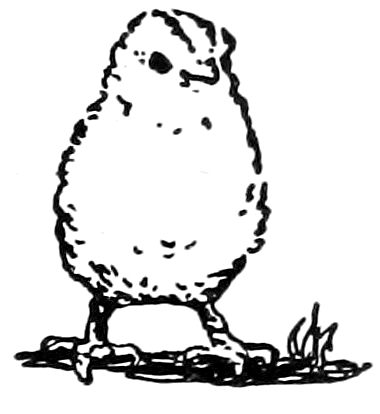
Mother Hen.59
See here, you lazy chicks,
Here’s the green garden patch,
If you’re hungry as
can be,
You should come here and scratch!
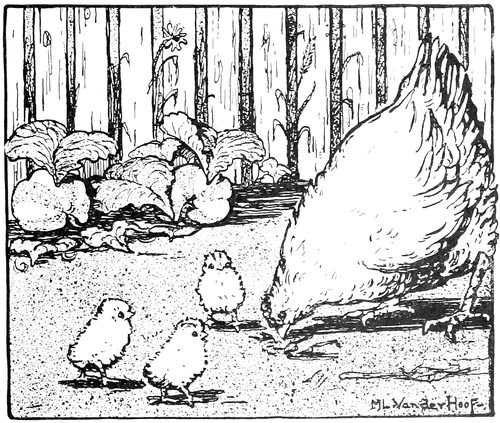
Little Bird. [Going to Big Tree.] Oh, please, Big Fir Tree, may I rest here in your branches? I have hurt my wing, and I cannot fly.
Big Fir Tree. No, I cannot have any little birds in my branches. I must grow straight and tall, for I mean to be a Christmas tree some day.
Little Bird. [Goes to Little Tree.] Oh, please, dear tree, may I not find shelter from the cold in your branches? My wing is broken, and I cannot fly. I 61have come a long way over the ice and snow.
Little Fir Tree. No, I cannot give shelter to any birds in my branches.
Little Bird. But I’m very tired, and I shall do your branches no harm.
Little Fir Tree. It cannot be. I must hold my head up high and my branches out straight, for I mean to be a Christmas tree.
Little Bird. I’m afraid I shall freeze out here in the snow. [Little Bird goes on.]
Little Bird. [Softly.] Please, Littlest Fir Tree, may I rest in your branches? I am so cold and hungry. I do not think I can go any farther.
Littlest Fir Tree. Yes, yes, Little Bird. 62Creep up close to my trunk. I will cover you as best I can with my little branches. Come close. I’m glad to have you here.
Little Bird. Thank you, kind tree.
Big Fir Tree. I hear sleigh bells. The bells come nearer and nearer. Some one is coming this way. Some one is coming through the woods.
Little Fir Tree. Who is it, Big Fir Tree? I cannot see so far as you can. Tell me what you see.
Big Fir Tree. I see a sleigh and reindeer. Some one all wrapped in fur is in the sleigh.
Little Fir Tree. Oh, I feel that some 63one is coming for me. Now I am going to be a Christmas tree. The bells sound nearer and nearer. I see the sleigh.
Santa Claus. [Alights from his sleigh and looks at Big Tree.] A fine tree—tall and straight! But it is too tall for my Christmas tree. I must look farther. [Goes on to next tree.] Ah! Here’s another; but there’s a little one I see just at the foot of the hill. I believe it is the most beautiful tree in all the wood. [Goes to Littlest Tree.] Little tree, you hold your head up straight, and your branches spread out in all directions. I must have you for my Christmas tree. [Seeing Little Bird.] Who is this 64that has found shelter in your branches? A little bird. I will take it, too, and it shall be some little child’s Christmas present.
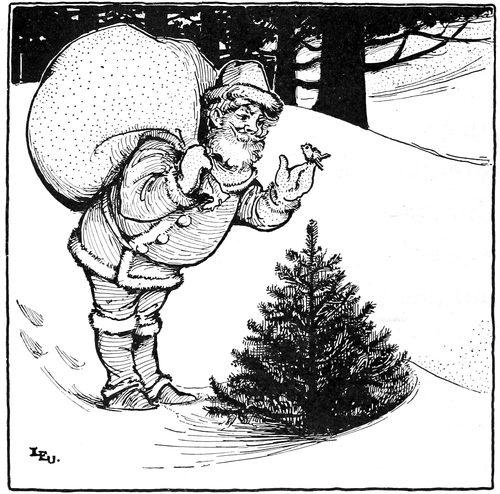
First Mouse. Christmas is here again. The air is full of the smell of good things to eat!
Second Mouse. It’s a gay time for us. I know there’ll be plenty of crumbs around now.
First Mouse. I wish Christmas came every night. But look at those old toys in the corner. I wonder why they look so sad.
French Doll. Look sad, do we? No wonder. It’s Christmas Eve and we 66don’t like to be here in the dark and cold. It isn’t fair!
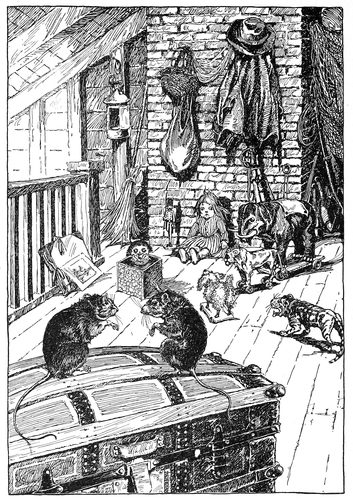
Christmas Eve in an Attic
Tin Soldier.67 We once hung on a Christmas tree.
First Mouse. It must have been a long time ago.
Tin Soldier. It was, indeed! But the children do not care to play with us now that we are so old.
French Doll. Old, sir? How can you say that? Just look at me! If my hair were combed and I had a new dress on, I’d still be a very nice doll! Old, indeed!
Second Mouse. Yes, I’m quite sure you would be very pretty.
Tin Soldier. And I’d be as good as 68any other tin soldier, if I had a new leg, a little paint, and a fresh gun.
First Mouse. Oh, I believe that, sir.
Lion. [Proudly.] Only my mane’s gone. [To Elephant.] But I see you have lost your trunk!
Elephant. Yes, some one broke it off. Now if I had a new trunk, I’d be all right. But look at the tiger! He has cracked his paint, and his stripes are all gone. It would be hard to make him look new again.
Tiger. Do you mean me? Oh, a few stripes of new paint, and I’d be as fine a tiger as you ever saw. Listen! Woolly Dog is trying to speak.
69Woolly Dog. [In a whisper.] My voice is almost gone. Some one punched me too hard once and broke the spring. If I had a new spring, I’d bark louder than ever. We’d never even hear your squeak then, little mice.
Jack-in-the-box. I never could get back after my lid came off. A hinge and a few screws, and I’d be as good as new. It’s a shame to leave me like this.
Mice. Hush! Some one is coming up the stairs.
French Doll. Who are you?
Mrs. Santa Claus. I am Mrs. Santa 70Claus. Every Christmas Eve I find all the old toys I can. I change them into new ones. Then I send them to the little children who have no other Christmas toys. I knew I’d find some old toys in this attic! Come here, all of you. Let me see what each one needs. Please, only one at a time! [Toys come about Mrs. Santa Claus.] Now, French Doll, I’ll begin with you. There! I’ve washed your face and combed your hair. You’re as good as new.
First Mouse. She does look fine!
Mrs. Santa Claus. Now, Tin Soldier, what can I do for you?
Tin Soldier. Give me a new red coat, 71and mend my leg. Oh, yes, and I’d like a new gun, too.
Mrs. Santa Claus. Here you are, sir. Now, Jack, down in your box while I mend the lid. There, now you can bob up as well as ever.
Lion. If you please, I want a new mane. A little boy pulled mine off. I haven’t had one for a long time.
Woolly Dog. Please don’t forget me. I can’t bark till I get a new spring.
Mrs. Santa Claus. Come, Elephant and Tiger. I’ll do you next. There, I’ve seen you all. You are now as good as toys can be.
French Doll. Are we to stay in this old attic?
72Tin Soldier. Can’t we be put on a Christmas tree again?
Mrs. Santa Claus. No. Listen to me. You are all to go out into the world to-night. Each one of you must make one little child happy. Go the way you wish, but be sure to find the child that needs you most. I must hurry to another old attic over the way. Good night, toys.
First Mouse. Will each toy try to make some child glad on Christmas morning?
Second Mouse. I hope so. How happy they all looked as they went out!
New Year. Here I am!
Old Year. Oh, there you are, are you? Come in and let us have a look at you, and shut the door, please, after you.
New Year. Frosty night! Fine and clear. I’ve had a pleasant journey.
Old Year. Humph! I don’t expect to find mine pleasant. A long cold drive, I call it. But to be sure, I thought it pleasant when I was your age, youngster! Is the sleigh waiting?
New Year. Yes, but there is no hurry. Wait a bit and tell me how matters are in these parts.
Old Year. [Shaking his head.] So, so! They 74might be better and yet they might be worse, too. They were worse before I came, much worse. I have done a great deal. Now I expect you, my boy, to do just as I did. Be a good year all the way through.
New Year. I shall do my best, you may be sure. And now tell me a little what there is to do.
Old Year. In the first place, you have the weather to attend to. You see the seasons have a way of running into each other and getting mixed, if you don’t keep a sharp lookout on them. The months, too, are a troublesome set. Then you must be careful how you turn on wet and 75dry weather. And one thing I want you to do very carefully—watch the leaves that are turned.
New Year. I thought Autumn attended to that sort of thing!
Old Year. Oh, I don’t mean leaves of trees. You know that at the beginning of a year half the people in the world say, “I am going to turn over a new leaf!” They mean that they are going to be better than they have ever been before. But leaves do not stay turned over. I know a great many little boys who said they were going to turn over new leaves. They were not going to tear their clothes, nor lose their jackknives, 76nor bring mud into the house on their boots. And the little girls were going to keep their rooms tidy and their buttons sewed on. But I haven’t seen much change in most of them.
New Year. I’ll attend to that. Anything else?
Old Year. Above all, take care of the children. Give them all the good weather you can. And now the horses are ready to go. My time is nearly up, so I start on my long drive. You will find everything in pretty good shape. Well, well, my boy, good-by, good luck to you.
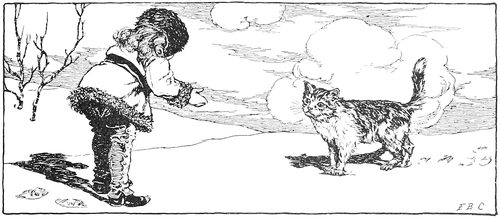
Mary. Pussy, aren’t you cold?
Pussy. Me-ow!
Mary.
Pussy, aren’t you cold?
Don’t look so sad.
Come here to me,
At home, I’ve
kittens two—
And I should like—indeed I should
To make a friend of you.
Pussy. Me-ow!
Mary. To make a friend of you.
Pussy.
I thank you, Miss, for your kind words,
And know they’re gently said;
But truth
to speak,
I do not like
That thing upon your head.
For much it looks to me
as though
Your very furry hat,
So soft and fine, might once have been
A
very furry cat. Me-ow!
A very furry cat.
Camel. Pray, sir, where are you going?
Man. I am going to the Wise Man to seek my fortune.
Camel. Seek mine, too. I have had these sacks of gold on my back for a long time. I cannot lie down. Seek mine, too.
Man. I will.
Tiger. Pray, sir, where are you going?
Man. I am going to the Wise Man to seek my fortune.
Tiger. Seek mine, too. For a long time I have had this thorn in my 80foot. I cannot rest. Seek mine, too.
Man. I will. [Man comes to Wise Man.]
Wise Man. I pray you, sir, why are you here?
Man. I seek my fortune. I am a very poor man.
Wise Man. Then, I fear you have been living only for yourself. Think of making others rich and you will become rich.
Man. In the jungle I met a camel. He carried two sacks of gold on his back. They were so heavy that he could not lie down. He asked me to seek his fortune, too.
Wise Man. Take the sacks off his back. Then he will be free, and 81you will have the gold. Why did you not do it before?
Man. I was thinking only of myself. After that I met a tiger. For many days he has had a thorn in his foot. He cannot rest. He asked me to seek his fortune, too.
Wise Man. Take the thorn out of his foot, and both of you will gain by it. Why did you not think of this before?
Man. I was thinking only of myself. [Man goes homeward. He meets the tiger.]
Tiger. Have you found my fortune?
Man. The Wise Man told me to take the thorn out of your foot.
Tiger. Thank you. Here, take my 82treasure. I did not think of giving it to you before. [Man goes on.]
Camel. Have you found my fortune?
Man. The Wise Man told me to take the sacks off your back.
Camel. Thank you. But stop! These sacks are full of gold. Take them, and both of us will be happy. Why did we not think of this before?
Man. We were thinking only of ourselves.


Thrush. Oh, Mrs. Magpie, I wish you would teach us how you build your nest. Every one says your nest is made better than any other.
Magpie. Is that true? Indeed! Come nearer then, and I will show you how I do it. [Birds draw near.] You see I take some mud and make a round cake with it.
84Thrush. Oh, that’s how it’s done! I can make one now. [Flies away.]
Magpie. Oh! the thrush went too soon. It is not yet done. Now I lay some twigs in the mud this way and that way, this way and that way.
Blackbird. I see! I see! [Flies away.]
Magpie. What! Has the blackbird gone, too? Next another layer of mud—twigs and mud, twigs and mud.
Wise Owl. Oh, that’s very easy! [Flies off.]
Magpie. Does the wise owl think that’s all? Now more twigs round the outside. Up and down; in and out; round and round.
85Sparrow. The very thing. [Flies off.]
Magpie. Oh! but the nest is not lined yet. I make it soft and warm inside with feathers.
Starling. That suits me. [Flies off.]
Magpie. Has the starling gone, too? It will take just one minute more.
Turtledove. Take two, Tousey, take two-o-o.
Magpie. One is enough.
Turtledove. Take two, Tousey, take two-o-o.
Magpie. One is enough, I tell you. Oh! are they all gone but you, silly turtledove? And I have just finished my nest. None of them will make a nest like mine.
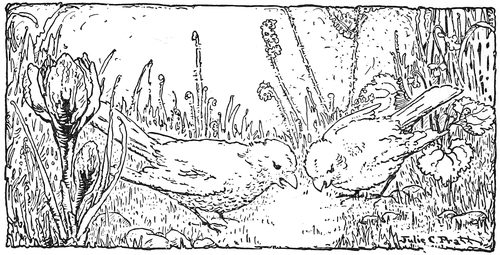
Mr. Sparrow. There! I’m glad enough to see the last of that snow. Chirp, chirp! Did you notice, my dear Mrs. Sparrow, how quickly it melted at the last?
Mrs. Sparrow. Yes, it seemed in a great hurry to go. It did the same 87thing last year when the warm days came.
Mr. Sparrow. Yes, yes, it always does—and don’t you know why? How could the little worms and green things come up out of the ground if the snow stayed all summer long? And then what should we do for good things to eat?
Mrs. Sparrow. Oh, yes, of course!
Mr. Sparrow. I see a worm now. You stay right here and I’ll get him for you. [He flies down and carries away the worm.]
Violet. That’s good. Worms are such dreadful creatures; always wriggling about one’s feet. I wonder what they are good for. Dear 88me, there’s Miss Crocus. Good morning! Did you have a good sleep?
Crocus. Yes, indeed. But I can’t unroll my petals far enough, I just want to stretch and stretch.
Violet. But it’s good to be back in the sunshine again.
First child. Oh, just see what I’ve found, a violet—a real one—and it’s a white one, too. Won’t Mary be glad.
Second Child. Oh, oh, can’t you find another?
First Child. No, there is just this one. I am going to take it up by the roots. Then it won’t wither.
Pussy Willow. [In basket.] Dear me! What does this mean? Why, Violet, you’ve got some dirt in my eye and on my nice new fur.
Fern. [In basket.] It Serves you right for being so proud. You think yourself better and prettier than others. Something always happens to any one who does that.
Pussy Willow. I wasn’t speaking to you.
Violet. Oh, please don’t quarrel. I am sure I am sorry if I have hurt any one. It was not my fault. I didn’t want to come here a bit. How I wish I could get out.
90Fern. Humph! Little good it will do to get out. I think these are the very people that Mr. Oak Tree was telling me about. They come every year looking for ferns and flowers. He says some of my ancestors for many generations have gone the same way. They always choose the finest, at any rate.
First Child. Oh, Mary, I found the sweetest little violet for you—a white one. I dug it up with all its roots, so it will not wither.
Mary. How lovely! You are very kind to bring me such beautiful flowers.

Second Child. It’s the first one that came up.
Mary. How I’d love to hunt for the violets! But it’s hard for any one who is lame to go to the woods. I don’t suppose I shall ever go there myself.
92First Child. Yes, you shall. Some day we’ll all go together.
Mary. Poor little flower! I wonder if it was sorry to leave its place in the woods to stay with me in this room. Please give it some water to drink. Then it will go on living.
Violet. How thankful I am that I came. Just a few days later and I might have withered there in the meadow. I would have been of no use to any one. Now I can make this little girl happy. I am so glad I grew. The best of all is to make some one happy.
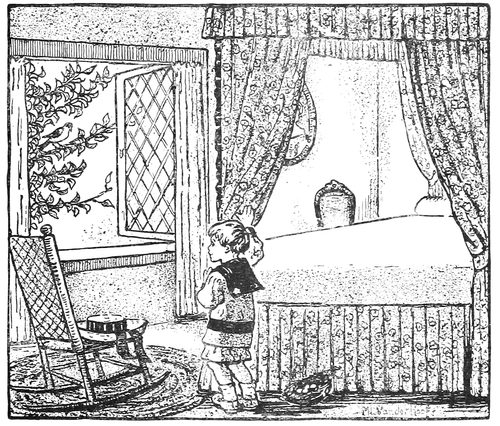
Yellow-breast.
To-whit, to-whit, to-whee!
Will you listen to me?
Who stole four eggs I laid
And the nice nest I made?
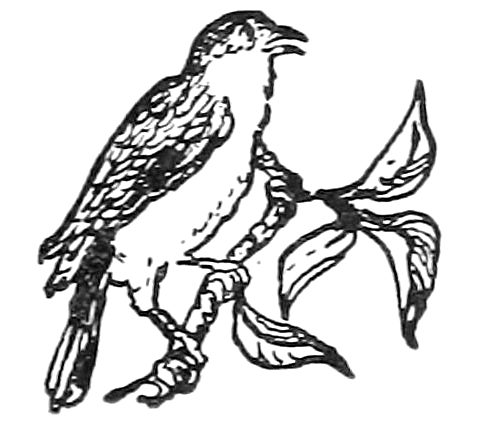
Cow.
Not I. Moo-oo! Moo-oo!
Such a thing I’d never do!
I gave you a wisp of hay
But didn’t take your nest away.
Not I! Moo-oo! Moo-oo!
Such a thing I’d never
do.
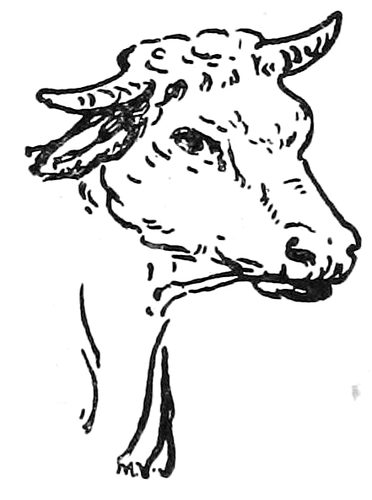
Yellow-breast.
To-whit, to-whit, to-whee!
Will you listen to me?
Who stole four eggs I laid
And the nice nest I made?
Bobolink.
Bob-o-link! Bob-o-link!
Now what do you think?
Who stole a nest away
From
the plum tree to-day?
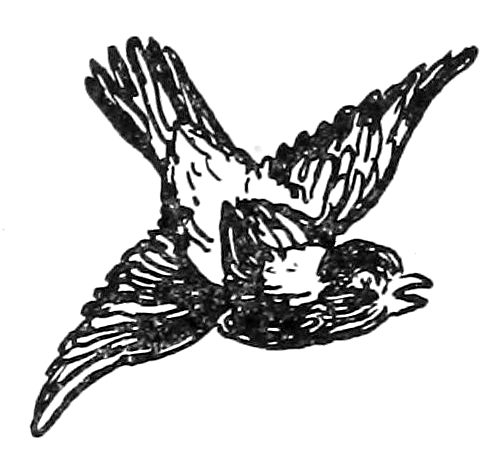
Dog.95
Not I! Bow-wow! Bow-wow!
I wouldn’t be so mean, I vow!
I gave hairs the nest to
make,
But the nest I did not take!
Not I! Bow-wow! Bow-wow!
I wouldn’t be
so mean, I vow.
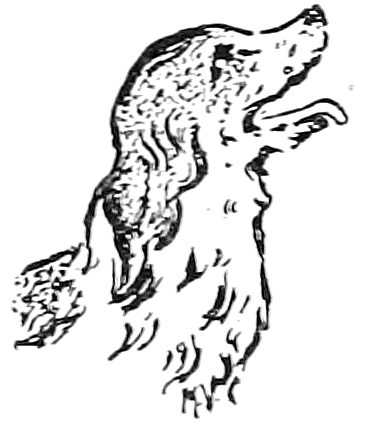
Yellow-breast.
To-whit, to-whit, to-whee!
Will you listen to me?
Who stole four eggs I laid
And the nice nest I made?
Bobolink.
Bob-o-link! Bob-o-link!
Now what do you think?
Who stole a nest away
From
the plum tree, to-day?
Cuckoo.
Coo-coo! Coo-coo! Coo-coo!
Let me speak a word, too!
Who stole that pretty
nest
From little Yellow-breast?
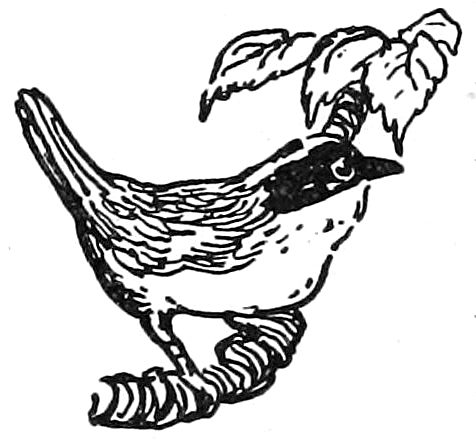
Sheep.
Not I! Oh, no! Oh, no!
I wouldn’t treat a poor bird so.
I gave wool the nest to
line;
But the nest was none of mine!
Oh, no! Oh, no! I wouldn’t treat a poor
bird so.
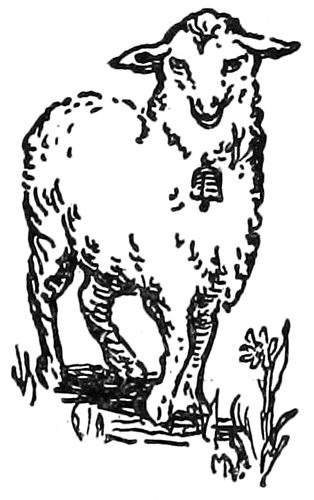
Yellow-breast.97
To-whit, to-whit, to-whee!
Will you listen to me?
Who stole four eggs I laid
And the nice nest I made?
Bobolink.
Bob-o-link! Bob-o-link!
Now what do you think?
Who stole a nest away
From
the plum tree, to-day?
Cuckoo.
Coo-coo! Coo-coo! Coo-coo!
Let me speak a word, too.
Who stole that pretty
nest
From little Yellow-breast?
Crow.
Caw, caw! Hear the crow!
I should like to know
What thief took away
A
bird’s nest, to-day?
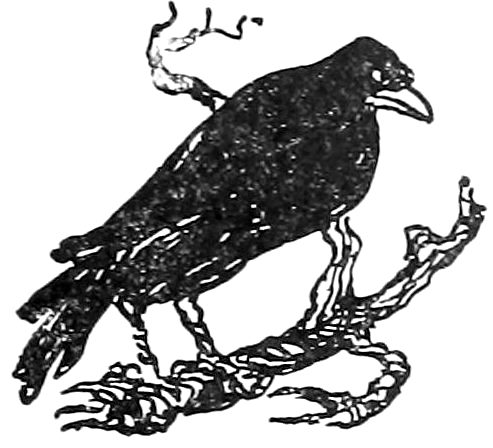
Hen.98
Cluck! Cluck! Hear me then!
Don’t ask me again!
Why, I haven’t a chick
Would do such a trick!
We all gave her a feather
And she wove them
together.
I’d scorn to intrude
On her and her brood.
Cluck, cluck! hear me
then,
Don’t ask me again.
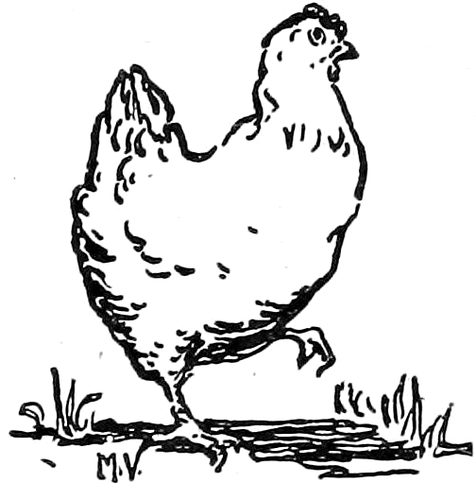
Bobolink,
Cuckoo,
Crow.
Chirr-a-whirr! Chirr-a-whirr!
All the birds make a stir,
Let us find out his
name
And all cry “For shame!”
Little Boy.
I stole that pretty nest
From poor little Yellow-breast.
And I feel so full of
shame
I do not like to tell my name!
Boastful Bamboo. Little bamboo tree, you bow and bend to every wind that blows. A bamboo tree should never show fear. Look at me! I stand straight and strong and bow to no one.
Little Tree. I know you are strong. You are much stronger than I am. I am only fit to trim the houses for the New Year’s feast. But you will be used in making some great house or maybe in making a palace.
101Boastful Bamboo. Only that! I shall be chosen for the mast of a big ship. Every one will look at me and say, “See what a beautiful mast that ship has!” As for you, timid little tree, you will never be brave enough even to deck the New Year’s feast.
Little Tree. Who knows? If I grow straight and strong. I may be chosen to do some good in the world!
Boy. [Looking at the Boastful Bamboo.] What a big, strong, bamboo tree!
Girl. But this dear little one beside it is prettier than any of the others.
Boy. Yes; let us bind her with our garland of flowers.
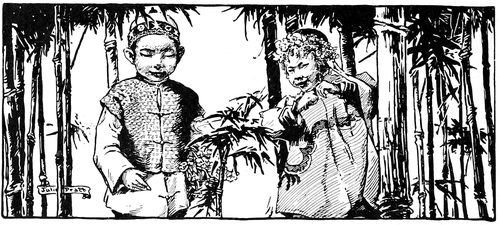
Girl. We’ll call her the Lady Silver Mist.
Woodcutter. [Looking at the big bamboo tree.] Here is a tall, straight tree. It will do for a mast. I will cut it first.
Boastful Bamboo. [To Little Tree.] Good-by,—I am sorry for you. I shall see the world now and do great things. Good-by, Little Tree!
Little Tree. Good-by! Good fortune go with you! [Big tree falls.]
103Boy. I’m glad he didn’t take our little tree.
Girl. [To Woodcutter.] Please don’t cut down our little tree. In all the forest we love it best.
Woodcutter. Ah, I see the little tree has friends.
Girl. Yes, we call her the Lady Silver Mist, and she is our playmate.
Woodcutter. But I’ve been sent to cut down all the trees in the forest. You must dig it up and carry it away, if you wish to keep it.
Boy. I’ll dig it up. We’ll take it home and plant it in our garden by the sea. [Children carry off the tree.]
Little Tree. All night the waves of the sea tossed the white foam and dashed the ships about. All around me lie pieces of wood washed up by the sea. What is this at my feet? A piece of a great bamboo tree! Can it be my friend of the forest?
Boastful Bamboo. Alas! I am your poor friend.
Little Tree. I wish I could help you.
Boastful Bamboo. No one can help me. I wish that I had lived in a garden as you have. Then I might have been useful for many years. Farewell, Little Tree.
Columbine. Spring, Spring! Oh, you naughty boy. Why are you here?
Spring. They didn’t want me, and neither do you.
Columbine. Oh, you poor dear boy. Come along at once to the fire and have some breakfast.
Spring. I didn’t come in before, because I thought you wouldn’t want me. [All sit down to breakfast.]
Clown. Sausages? I’m tired of sausages; such ages since we had anything else.
Pantaloon. Ho! ho! ho! [Waves his wand.] 106We’ll have rabbit pie, then. [Dish of sausages turns to rabbit pie.]
Clown. Do you know how they get the rabbits into the pie?
Spring. [Shakes his head.] No.
Clown. Would you like to know?
Spring. Please, sir.
Clown. Well, first of all, you make a nice rich brown crust, and you put it over a large dish. Then you cut a round hole from the pie crust. Fill the dish with lettuce and put it out on the lawn.
Spring. On the lawn?
Clown. Yes. Then the rabbits come. They pop down the hole in the crust to eat the lettuce. When the pie is 107full of rabbits, you run from behind a tree, cover the hole in the crust, and then with the dish in your arms, you dash into the kitchen,—pie in the oven, oven hot, fire bright—and, here we are!

Columbine. Don’t you believe him.
Pantaloon. [To Spring.] Why did you come back?
Spring. The farmers said I made the buds come out too soon. I only stroked the trees and the little sticky buds peeped out to kiss my hand. The gardeners were angry because, where I stepped, the flowers came out too soon, they said, and then—
Columbine. Never mind, dear. We are all glad to see you.
Pantaloon. And then?
Spring. Then East Wind came and 109Snow and Jack Frost, and they nipped my flowers, and hurt my trees, and made my lambs shiver behind the hedges. The goblins who sing in the fire hobs sang and sang till the people turned their backs on me and crouched up to the fire again and began to tell ghost stories.
Columbine. But you must go back now, and fight Jack Frost and scare Winter away. You have had your breakfast, dear, and now like all the world, you must do your work. Yes, dear, you must keep on working till summer wakes up.
Spring. Good-by.
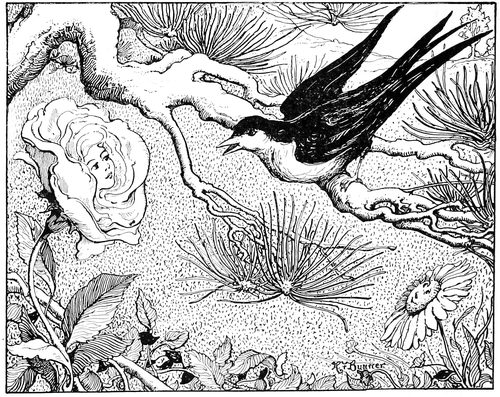
Daisy.
Oh dear, Miss Rose, do tell me please,
Is it you holds up the sky?
Rose.
Dear Daisy, no, no, indeed,
I cannot reach so high.
111And very
far above me
Is the blue and lovely sky.
But if you wish to know.
To find out I will try.
Perhaps that tall fir tree
Is holding up the sky.
You lift your head so high,
Do you hold up the sky?
Fir Tree.
[Shaking his head.]
Oh no, indeed, sweet Rose
It surely is not I!
It may be this lofty elm,
Who stands to me so nigh.
Elm.
No, no, it is not I.
But a mountain very tall
112In the distance I can
spy,
And on his shoulders rests,
I think, the wondrous sky.
You lift your head so high,
Do you hold up the sky?
Mountain.
And who is it who would
For these secrets pry?
I’ve stood here many an age,
But I never touched the sky.
Rose.
Sweet Daisy, dearest friend,
I fear before we die
We never shall find out
Who is holding up the sky.
Daisy and Rose.113
[Together.]
O Bird, you fly up so high,
Will you not please tell us
Who is holding up the sky?
Bird.
’Tis He who made the daisy
And He who made the rose;
’Tis He who made the fir
tree,
The elm, and all that grows.
’Tis He who made the mountain
And made the bird to fly—
The good and Heavenly
Father,
Who holdeth up the sky.
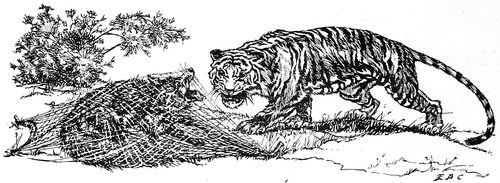
Tiger. [To fox in a net.] So you are here. Caught!
Fox. Only to help you, Tiger.
Tiger. To help me? How is that?
Fox. Why, the other day you said you could not get enough men to eat. So I got into this net. When the men come to take me you may get the men.
Tiger. A fine plan! Can I believe you?
115Fox. Believe me. Hide in the bushes close by. I’ll show you the men when they come.
Tiger. Can I believe you?
Fox. Believe me, Tiger. Here comes one now. Quick! Behind the bushes! [Tiger hides.]
Hunter. [To fox.] So here you are. Caught!
Fox. Only to help you, Hunter.
Hunter. To help me? How is that?
Fox. Why, the other day you said you could not get the tiger who has been killing and eating your cattle. So I got into this net to-day that you may have him.
116Hunter. A fine plan. Can I believe you? But how will I get him?
Fox. Believe me, Hunter. [Quietly.] He came here to eat me up, but he saw you coming. He is now behind the bushes. Let me out of this net, and I will take you right to him.
Hunter. Can I believe you?
Fox. Believe me, Hunter. Only let me out, and you’ll see. [Hunter lets fox out.] Come! [Calling out loud.] Now, Sir Tiger, here is the hunter; and, Mr. Hunter, there is your tiger. I have kept my word to both; you must settle the matter between yourselves.
Hunter. Alas! Alas!
Tom. [To lobster caught in a lobster pot.] What, have you been naughty, and have they put you in the lockup?
Lobster. I can’t get out.
Tom. Why did you get in?
Lobster. I came in for that ugly piece of fish.
Tom. Where did you get in?
Lobster. Through that round hole at the top.
Tom. Then why don’t you get out through it?
Lobster. Because I can’t. I have jumped upwards, downwards, backwards, 118and sideways, at least four thousand times, and I can’t get out. I always get up underneath then and can’t find the hole.
Tom. Stop a bit. Turn your tail up to me, and I’ll pull you through hindforemost, and then you won’t stick in the spikes. [Tom pulls lobster.] Hello, here is a pretty business. Now take your great claws and break the point off those spikes, and then we shall both get out easily.
Lobster. Dear me, I never thought of that!

First Fish. What is the matter, little fish?
Little Fish. Have you not heard? Our sea queen is very ill.
First Fish. Osa, our queen, very ill, did you say?
Little Fish. Yes, yes, we have done everything; but she grows worse.
Second Fish. We fear she must die.
120First Fish. This cannot be. Come, tell me what you have done.
Little Fish. Oh, we fed her seaweed and laid her upon a bank of sponges. Every little fish helped. But she is no better.
First Fish. Our queen Osa! This is sad indeed. Is there no wise creature in the sea who can help us?
Third Fish. There must be. Let us think hard.
Little Fish. I know. Let’s ask the turtle. He’s wise. He goes out of the sea upon the land. Surely he must learn many things there. Perhaps he is just the one to tell us what to do to save our queen.
121Second Fish. Go at once and bring him back with you. [Little Fish goes out.]
First Fish. He won’t be gone long. No one swims faster than our little fish.
Third Fish. Here he comes back already, and the turtle is with him.
All the Fish. Good, good. [Turtle and Little Fish enter.]
First Fish. O Turtle, have you heard that our sea queen is about to die?
Turtle. I know that she is very ill.
Second Fish. Can you not help us to save her? You are wise, Turtle. It’s because you don’t stay down in the sea, but go upon the land, that 122you learn about so many things. What will cure our queen?
Turtle. [Slowly.] Yes, I do learn a great many things on the land. Let me think—I am thinking—yes—I believe—yes—I know, I’m sure I know just what will save her life. I have it—a monkey’s heart—the very thing! I heard about it one day as I was resting upon the shore. A monkey’s heart can cure anything!
All the Fish. Wonderful!
Little Fish. Will you go and get one? O Turtle, you know we would go if we could leave our homes as you can. You will go, won’t you?
Turtle. I will go—at once.
Turtle. Dear me—not a monkey to be seen anywhere! Well, I’ve waited and waited. It’s very hot here on the sand. I’m sleepy. I’ll just take a nap. [Sleeps. Monkeys (three) come.]

First Monkey. [Seeing turtle.] What’s this?
Second Monkey. I don’t know. I never 124saw anything like that before. Now, I see, it’s a big stone.
First Monkey. So it is.
Third Monkey. I don’t believe it.
Second Monkey. Well, you just put your paw on it and see. There, it’s as hard as it can be.
Third Monkey. I know. It’s a great shell. [Touches the turtle.] A big hard one, hard all over. [Turtle wakes and catches monkey.] Oh, oh, oh! Let me go.
Turtle. No, I will not let you go. Be quiet and do what I tell you, and I will not hurt you. Your brothers have run away. You must come down under the sea with me.
Monkey. Why do they keep me here? No one to talk to, no one to play with, no trees to climb. Only one friend, the jellyfish with his hard shell. I’d like him better if he hadn’t one. It makes me think of that bad turtle that brought me down here on his hard back. Here comes the old jellyfish now.
Jellyfish. Hello, Monkey, you look sad.
Monkey. So would you if you wanted trees instead of seaweed, and land instead of water, and warm sunshine, and other little monkeys to play with.
126Jellyfish. Poor Monkey! I am sorry for you. But of course you must stay here until they come to get you.
Monkey. Until who comes to get me?
Jellyfish. The fish, of course. Don’t you know?
Monkey. Indeed, I don’t, Jellyfish. What do you mean?
Jellyfish. They want your heart for the queen. In a few days they’ll come and kill you and give her your heart to eat.
Monkey. Oh, dear me! Give my heart to the queen to eat? Why, Jellyfish, do you know what you are talking about? What wrong have I done that I should be killed?
127Jellyfish. Oh, you’ve done no wrong. But our dear queen is very ill, and your heart is the only thing that will cure her. We cannot get your heart unless we kill you; so try and be brave about it.
Monkey. [To himself.] I shall not give my heart to the queen. I must get away from here somehow. But how? I do not know the way. Only the turtle could take me back, and he won’t. What can I do? Here comes the turtle now.
Turtle. You look sad, Monkey. What is the matter?
Monkey. Dear me, Turtle, I was 128just thinking of something I have left at home that I need very much.
Turtle. Indeed! What is it, dear Monkey?
Monkey. It’s my heart, Turtle. Just before I left home I hung it out on a bush to dry. If the rain comes, it will be spoiled.
Turtle. What is this you tell me?
Monkey. It’s about my heart. Some one must carry me back to the land so that I can get it.
Turtle. Well, well, is there no other way? Then I must take you back to get your heart. That is the best plan, and we must start at once. Come. [They go out together.]
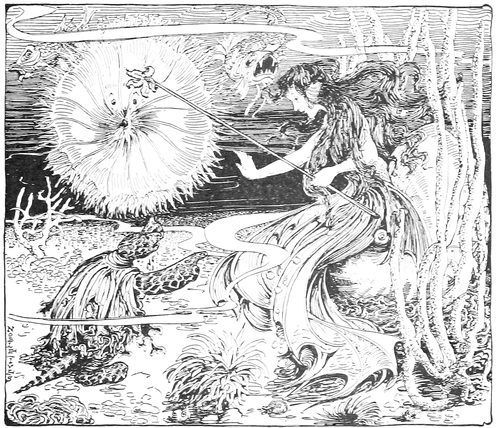
Queen Osa. My dear Turtle, where have you been so long, and oh, what has happened to you?
Turtle. Dear Queen, I am very sad, and very cold, and very ill. My 130poor body is without its covering, for see, I have lost my shell.
Queen Osa. Poor Turtle! Come tell me all about it.
Turtle. The monkey told me he had left his heart at home and he asked me to take him back so he could get it. I believed him. You know I wanted the heart for you.
Queen Osa. You are very kind, Turtle.
Turtle. I took him on my back. When we got to the land he sprang off my back and up the nearest tree. He told his brothers what had happened to him. Then they all rushed at me. They tore off my shell and threw my body back into the sea without it.
131Queen Osa. Poor Turtle! Never mind. I’ll give you another shell, for you did your best. Some one must have been telling the monkey tales. Jellyfish, you were his friend. Do you know anything about this?
Jellyfish. I told the monkey that we were going to kill him so that we could get his heart for you. I told him to try and be brave about it.
Queen Osa. You are to blame, then, Jellyfish, for all this trouble. To punish you for meddling, I will take away your shell. And you must go without it forever.
Little Girl.
I would like you for a comrade, for I love you, that I do,
I never met a little calf
as amiable as you;
I would teach you how to dance and sing and how to talk and
laugh,
If I were not a little girl and you were not a calf.
Little Calf.
I would like you for a comrade; you should share my barley meal
133And butt
me with your little horns just hard enough to feel;
We would lie beneath the
chestnut trees and watch the leaves uncurl,
If I were not a clumsy calf and you a
little girl.

Gluck. What a pity my brothers never ask anybody to dinner. I’m sure when they’ve got such a nice piece of mutton as this it would do their hearts good to have somebody to eat it with them. [Knock sounds at the door.] It must be the wind. Nobody else would dare to knock double knocks at our door. [Gluck goes to the window.]
Little Old Gentleman. Hello! That’s not the way to answer the door. I am wet. Let me in.
135Gluck. I beg your pardon, sir. I am very sorry, but I really can’t.
Little Old Gentleman. Can’t what?
Gluck. I can’t let you in. I can’t, indeed. My brother will beat me, sir, if I thought of such a thing. What do you want, sir?
Little Old Gentleman. Want? I want fire and shelter. There’s your great fire there blazing, cracking, and dancing on the walls with nobody to feel it. I only want to warm myself.
Gluck. He does look very wet. I’ll just let him in for a little while.
Little Old Gentleman. That’s a good boy. 136Never mind your brothers. I’ll talk to them.
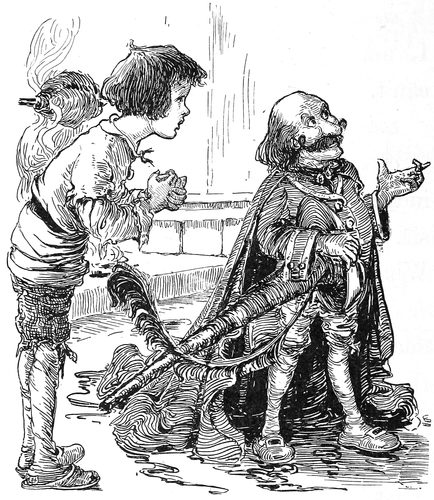
Gluck. Pray, sir, don’t do any such 137thing. I can’t let you stay till they come.
Little Old Gentleman. Dear me. I’m very sorry to hear that. How long may I stay?
Gluck. Only till the mutton’s done, sir, and it’s very brown. [Little Old Gentleman seats himself before the fire.] You’ll soon dry there, sir. Mayn’t I take your cloak?
Little Old Gentleman. No, thank you.
Gluck. Your cap, sir?
Little Old Gentleman. I am all right, thank you.
Gluck. But, sir! I’m very sorry, but really, sir, you’re putting the fire out.
Little Old Gentleman. It’ll take longer to 138do the mutton then. That mutton looks very nice. Can’t you give me a little bit?
Gluck. Impossible, sir.
Little Old Gentleman. I’m very hungry. I’ve had nothing to eat yesterday nor to-day. They surely couldn’t miss a bit from the knuckle.
Gluck. They promised me one slice to-day, sir. I can give you that.
Little Old Gentleman. That’s a good boy.
Gluck. [To himself.] I don’t care if I do get beaten for it. [Loud rap at the door. Schwartz and Hans enter.]
Schwartz. What did you keep us waiting in the rain for?
Hans. Ay, what for, indeed!
139Schwartz. Bless my soul, who’s that?
Gluck. I don’t know, indeed, brother.
Schwartz. How did he get in?
Gluck. My dear brother, he was so very wet.
Schwartz. Who are you, sir?
Hans. What’s your business?
Little Old Gentleman. I am a poor old man, sir, and I saw your fire through the window and begged shelter for a little while.
Schwartz. Have the goodness to walk out again, then.
Little Old Gentleman. It’s a cold day to turn an old man out, sir. Look at my gray hairs.
140Hans. Ay, there are enough of them to keep you warm. Walk!
Little old Gentleman. I’m very, very hungry, sir. Couldn’t you spare me a bit of bread before I go?
Schwartz. Bread, indeed! Do you suppose we’ve nothing to do with our bread but to give it to such fellows as you?
Hans. Out with you.
Little Old Gentleman. A little bit?
Schwartz. Be off!
Little Old Gentleman. Pray, gentlemen.
Hans. Off!
Little Old Gentleman. Gentlemen, I wish you a very good morning. At twelve o’clock to-night I’ll call again. But 141you will not be surprised if that visit is the last I ever make you.
Schwartz. If I ever catch you here again—[To Gluck.] A very pretty business, indeed, Mr. Gluck. Dish the mutton, sir. If ever I catch you at such a trick again—bless me, why the mutton’s been cut.
Gluck. You promised me one slice, brother, you know.
Schwartz. Oh, you were cutting it hot, I suppose, and going to catch all the gravy. It will be long before I promise you such a thing again. Leave the room, sir, and have the kindness to wait in the coal cellar till I call you.
Schwartz. [Starting up.] What’s that?
Little Old Gentleman. Only I, Southwest Wind.
Hans. The room is full of water, and the roof is off.
Little Old Gentleman. Sorry, gentlemen. I am afraid your beds are dampish. Perhaps you had better go to your brother’s room. I’ve left the ceiling on there. You’ll find my card on the kitchen table. Remember, this is the last visit from Southwest Wind.

Child.
Sparrow in the cherry tree,
Won’t you drop one down for me?
Sparrow. Presently, presently.
Child.
Sparrow, sparrow, Greedy-pate!
144There’s a fine one! Drop it straight!
Sparrow. Little boys should learn to wait!
Child.
Sparrow, without more ado,
Come, be kind and drop me two.
Sparrow. They’re not ripe enough for you.
Child.
Saucy sparrow, cease your fun!
What, you’re off—and give me none!
Sparrow. All are gone, all are gone.
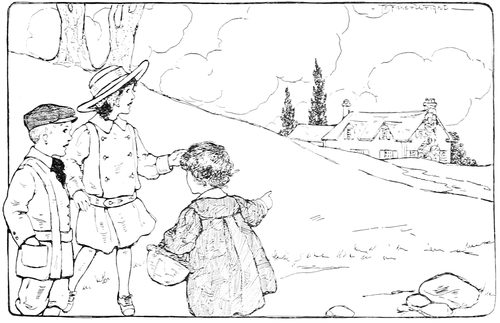
First Child. Oh, how bare the woods look. Not a flower or bud anywhere!
Second Child. Spring is late.
Third Child. Ow-o-o. Let’s run home.
Second Child. Spring has forgotten us. I shan’t come here again.
Spring. At last! Be off, Jack Frost and North Wind. You have kept me waiting too long. Now to work. I must waken the flowers. [Waves her wand.]
Flowers. [Awaken.] Welcome, Lady Spring. We have looked for you long.
Spring. Break into buds, trees.
Trees. [Awaken.] Welcome, Lady Spring. We have looked for you long.
Spring. Waken, animals.
Animals. [Awaken.] Welcome, Lady Spring. We have waited for you long.
Spring. But where are the children? Perhaps they do not know we are here. I must find some way to send them a message. Robin, will you take it?
147Robin. I am too busy building a nest for my little ones. Send the fox.
Spring. Fox, will you take it?
Fox. I dare not go. The people will think I have come to steal their chickens. Send Black Bear.
Spring. Black Bear, will you take the message to the children?
Black Bear. Don’t send me. I am so big I would frighten them. All children love the rabbit. Send him.
Spring. Rabbit, will you go?
Rabbit. Yes, yes. I’ll go. But, dear me! The dogs! They might catch me.
Spring. Go when they are asleep.
Rabbit. Good. I will go to-night. But what message shall I take?
148Spring. I’ll weave a basket of twigs and leaves and green grass, and line it with soft moss. Each one of us will put a message into it.
Spring. Here is the basket, Rabbit.
Robin. Here is an egg.
Thrush. Here is another.
Squirrel. Here are some acorns that have just sprouted.
Spring. My prettiest flowers go to the children. There! Stop at every house where there is a child.
Rabbit. I shall not forget. I’m off. [To himself.] I’ll just make a nest of grass for each child, and leave it on 149the doorstep. An egg and a spring flower in each—and the children will know!
First Child. What a pretty nest! I found it on my doorstep—flowers and twigs and an egg.
Second Child. I found one, too—with everything in it from the woods.
Third child. Oh! Spring must be here.
First child. See, here are the tracks of the rabbit’s feet! He came to tell us.
Second Child. Then spring is here. Let’s run to the woods—now!
Children. [Running.] Spring is here! Bunny has brought us the message.

Note: Jizu is a roadside image or statue.
Sanja. Dear, dear, there goes one of my finest dumplings rolling down the hill. That will never do. I cannot lose that one. I must run and catch 151it. [Runs after it. As she goes she meets Lord Jizu.] Good morning, my Lord Jizu! Have you seen a rice dumpling fall this way?
Lord Jizu. Good morning! Yes, I saw a dumpling. It went past here. It went down the hill skipping as if it had legs.
Sanja. Oh, thank you. Then I must skip after it.
Lord Jizu. No, no. Do not go on. An ogre lives down there. He may do you harm.
Sanja. But I must have my dumpling. [Laughing.] Tee-hee-hee! Tee-hee-hee! [Goes on.]
[To Second Lord Jizu.] My good Lord 152Jizu, have you seen a dumpling pass this way?
Second Lord Jizu. As if it had wings! It flew past me.
Sanja. Then I must hurry to catch it.
Second Lord Jizu. You must not think of that. There is a wicked ogre below. He does not like old women. He will be cruel to you, and he might eat you up.
Sanja. But I must have my dumpling. He’ll not eat an old woman like me. [Laughing.] Tee-hee-hee! Tee-hee-hee! [Goes on.]
[To herself.] If I ever catch that dumpling, I’ll eat every bit of it 153myself. Tee-hee-hee! [To Third Lord Jizu.] My good Lord Jizu, have you seen my dumpling pass this way?
Third Lord Jizu. Yes, it passed but a moment ago. Do not think of searching for it. The ogre who lives beyond is cruel, and he’ll surely eat you.
Sanja. He’ll not eat an old woman like me. Tee-hee-hee! [They hear a terrible noise. Ogre comes.]
Third Lord Jizu. Here comes the ogre. Get behind me. Be quick!
Ogre. [Deep voice.] Good morning, Lord Jizu! I smell meat.
Third Lord Jizu. Good morning, Ogre. Is it not dumpling that you smell? 154I saw one pass along this road a little while ago.
Ogre. No, indeed. It is not dumpling. What I smell is meat.
Third Lord Jizu. I do not smell it. Are you sure it is not rice dumpling? It seems to me that I smell a little of it about you.
Ogre. That is not strange. I saw the dumpling rolling my way. I caught it and ate it. It was good. I wish I had the one who made it. What I smell now is meat, meat, meat; juicy, young, tender. [Sanja bursts out laughing.]
Sanja. Tee-hee-hee! Tee-hee-hee!
Ogre. [Seeing Sanja.] Who are you?
155Sanja. I am the one who made the dumpling. Tee-hee-hee! Why did you eat it?
Ogre. Because it was good.
Sanja. You couldn’t eat me for that reason. Tee-hee-hee!
Ogre. No, I shall not eat you. You shall come home with me and be my cook. As long as you cook your dumplings for me I will not harm you. [Sanja goes with the ogre.]
Ogre. You are a good cook; but you use more rice than you need. You should put but one grain into the pot.
Sanja. One grain? Tee-hee-hee. 156How could any one live on one grain of rice?
Ogre. I will show you. Put one grain of rice into the pot. Then take this paddle in your hand. If you want rice for ten persons, stir ten times, in this way. [Stirs paddle about in the water.] See the grain of rice burst into ten pieces. If you want rice for one hundred persons, stir one hundred times. The grain of rice will burst into one hundred pieces.
Sanja. Tee-hee-hee! Tee-hee-hee!
Ogre. This is a magic paddle.
Sanja. Tee-hee-hee! Tee-hee-hee!
Ogre. [To himself.] How strange that she laughs at everything.
Sanja. I won’t stay here another day. The ogre is off hunting. Tee-hee-hee. He’ll never know how I got out of the castle and over the river. Tee-hee-hee. Tee-hee-hee. [Hears call.] Who calls? The ogre. Oh, he sees me! I am afraid to go back.
Ogre. [From other side of the river.] What are you doing there, you Laughing Dumpling? Go back to my kitchen, I say. Go back!
Sanja. Tee-hee-hee!
Ogre. How strange that she laughs at everything. She shall not laugh at me. [Starts to go across river.]
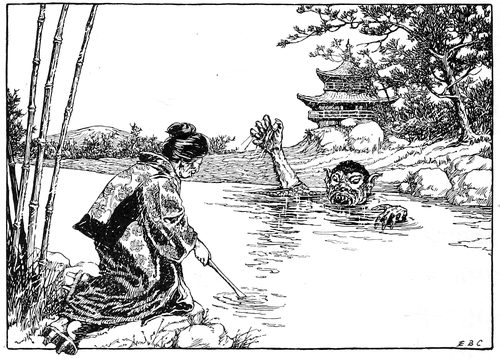
Sanja. What shall I do to get away. The magic paddle! The magic paddle! I have it tucked in my belt. I’ll stir the water in the river with it. There! Tee-hee-hee! Tee-hee-hee! See the water flows and flows, higher and higher. The ogre must swim for his life. Tee-hee-hee! Tee-hee-hee!
Tiger. Let me out of the cage, Brahman!
Brahman. No, I will not. If I let you out of the cage, you will eat me.
Tiger. O Brahman, indeed I will not. I could not be so unkind as that. Only let me out to get a drink of water. Then I will come back. [Brahman opens the cage.]
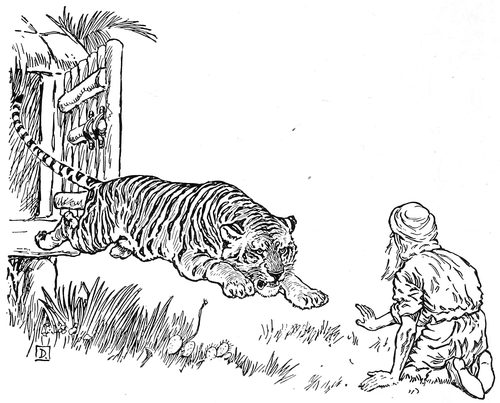
Tiger. [Jumping out.] Now, I will eat you first and then I’ll drink the water.
Brahman. Alas! How foolish I was to let you out. Only do not kill me hastily. Let me ask the first three things I meet to tell me whether it is just and fair that you should put 161me to death. If all of them say it is just and fair for you to kill me I shall be willing to die.
Tiger. It shall be as you say. You may ask the opinion of three.
Brahman. O Tree, hear my story and tell me who is right. The tiger begged me to let him out of his cage, to drink a little water. He promised not to hurt me if I did so. But now that I have let him out he wishes to kill and eat me. Is this right?
Tree. I give shade to all who pass by, but when they are rested they cut my branches and break off my leaves. Why do you complain?
162Brahman. Alas! Alas! [Goes on.] O Buffalo, hear my story and tell me who is right. The tiger begged me to let him out of his cage to drink a little water. But now that I have let him out he wishes to kill and eat me. Is this right, O Buffalo?
Buffalo. Look at me! See how hard I work. When I was young I had the best of food. But now that I am old I am kept here in the field. I have only the coarsest food to eat. Why do you complain?
Brahman. Alas! Alas! [Goes to Road.] O Road, hear my story and tell me who is right. The tiger begged me to let him out of his cage to drink a 163little water. But now that I have let him out he wishes to kill and eat me. Is this right, O Road?
Road. Poor Brahman! How can you hope for anything else? Think of me. Here I am useful to every one. Yet all, rich and poor, great and small, trample on me as they go past. Why do you complain?
Brahman. Alas! Alas! Alas! There is no help for me. [Turns homeward.]
Jackal. What’s the matter, Mr. Brahman? You look very sad.
Brahman. I am sad. As I was walking along the road I came to the tiger in his cage. He begged me to let him out to drink a little water. He 164said he would not harm me if I did so.
Jackal. Did you let him out?
Brahman. I did. As soon as he was out he tried to eat me. I asked him to wait till I could get the opinion of the first three things I came to whether it was right for him to kill me. I asked the tree, the buffalo, and the road. Alas!
Jackal. What did they say?
Brahman. They all said it was right.
Jackal. Who said it was right?
Brahman. Why, the tree, and the road, and the buffalo.
Jackal. Oh, it’s very confusing. Let me see! Perhaps matters are not 165so bad as you think. But it’s very confusing. You say the tiger said the tree and the road and the buffalo were right?
Brahman. No, no, no. The road and the tree and the buffalo said the tiger should kill and eat me!
Jackal. It all goes in one ear and out the other. It’s very confusing. Take me to the place where it happened. Then I shall be able to understand.
Tiger. You have been away a long time. I want my dinner.
Brahman. Just wait until I make the jackal understand how it all 166happened. He is so slow in his wits! I must explain things to him.
Jackal. Show me where you stood.
Brahman. Here, by the cage.
Jackal. Right there?
Brahman. Right here.
Jackal. Where was the tiger then?
Tiger. I was in the cage!
Jackal. Yes, yes. Let me see, how did it all begin?
Brahman. Tiger was in the cage and I came walking by—
Jackal. Yes, yes, I see. You were in the cage and the tiger came walking by—
Tiger. [Angrily.] Not at all! I was in the cage.
167Jackal. Yes, my lord. Dear, dear, it’s very confusing. It has all got mixed up in my mind. Let me see, the tiger was in the Brahman and the cage came walking by! No, no, that was not it, either! Well, don’t wait for me. I shall never understand.
Tiger. Yes, you shall understand. Look here, I am the tiger.
Jackal. Yes, my lord.
Tiger. And that is the Brahman.
Jackal. Yes, my lord.
Tiger. And that is the cage.
Jackal. Yes, my lord.
Tiger. And I was in the cage. Do you understand?
168Jackal. Yes, my lord. But please, my lord, how did you get in?
Tiger. How did I get in? Why, the usual way, of course!
Jackal. Oh dear me! My head is beginning to whirl again. Please don’t get angry, my lord, but what
is the usual way?
Tiger. This way. Now do you understand? [Tiger jumps into cage.]
Jackal. Yes, I understand now. And I think we had better leave you just where you are. [Locks cage door.]
Elephant. Dear me—we must find one.
Tiger. One what?
Elephant. A story-teller for the lion. He wants one who will tell him stories one after another without stopping. It’s a task indeed.
Camel. Yes, yes, and he will put us to death if we fail to find some one who can do so.
Tiger. He’s king, and they say the king kills when he will. I do not know what we shall do.
170Fox. Let me think. I have it—Tell the king you have found the story-teller that he wished for.
Lion. So, Mr Fox, you are to tell me stories without ceasing.
Fox. Yes, O King Lion.
Lion. Very well—begin.
Fox. There was once a fisherman who went to sea. He had a large net. He spread it out far and wide. One day a great many fish got into the net. Just as the fisherman was about to draw it up, the cords broke, and a small hole was made in the side of the net. Now, this hole was just large enough for one fish 171to slip through at a time. So, one fish got out—[Fox stops.]
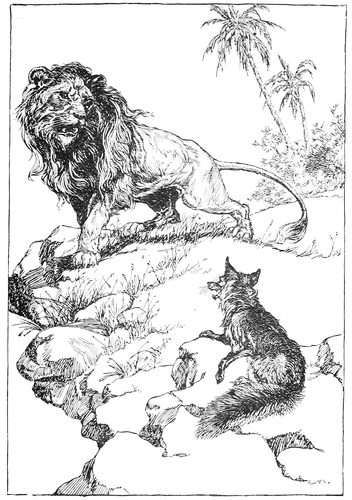
Lion.172 Yes?
Fox. Then two fishes got out. [Fox stops.]
Lion. What then?
Fox. Then three escaped. [Fox stops.]
Lion. [Impatiently.] Yes, yes! but the story? I tell you, go on with the story. What then?
Fox. Then four fishes got out.
Lion. Come, come, sir, you are not telling me anything new.
Fox. O King! Each lot of fishes was different from the rest.—Then the hole grew a little larger and—
Lion. But, wherein is the wonder?
173Fox. Why, your majesty, what can be more wonderful than for fish to escape in lots, each lot greater than the other by one?
Lion. [Impatiently.] How long will it take all those fishes to get out?
Fox. O King Lion, it was a large net—there were thousands and thousands of fishes in it.—Then the hole grew a little larger and—
Lion. Stop, stop! I can not stand this. Leave my court at once—anything to stop those fishes.
Fox. [To animals.] Fear not, I have saved you all. The tyrant won’t try that plan again.
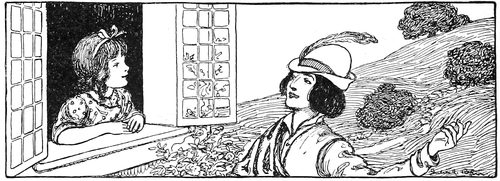
Child.
Traveler, what lies over the hill?
Traveler, tell to me.
I am only a child from
the window sill,
Over I can not see.
Traveler.
Child, there’s a valley over there,
Pretty and wooded and shy,
And a little
brook that says, “Take care,
175Or I’ll drown you by and by.”
Child. And what comes next?
Traveler.
A little town
And a towering hill again;
More hills and
valleys up and down
And a river now and then.
Child. And what comes next?
Traveler.
A lonely moor
Without a beaten way;
And gray clouds sailing
slow before
A wind that will not stay.
Child. And then?
176Traveler.
Dark rocks and yellow sand,
And a moaning sea beside.
Child. And then?
Traveler.
More sea, more sea, more land,
And rivers deep and wide.
Child. And then?
Traveler.
Oh, rock and mountain and vale,
Rivers and fields and men,
And over
and over repeat the tale,
And round to your home again.